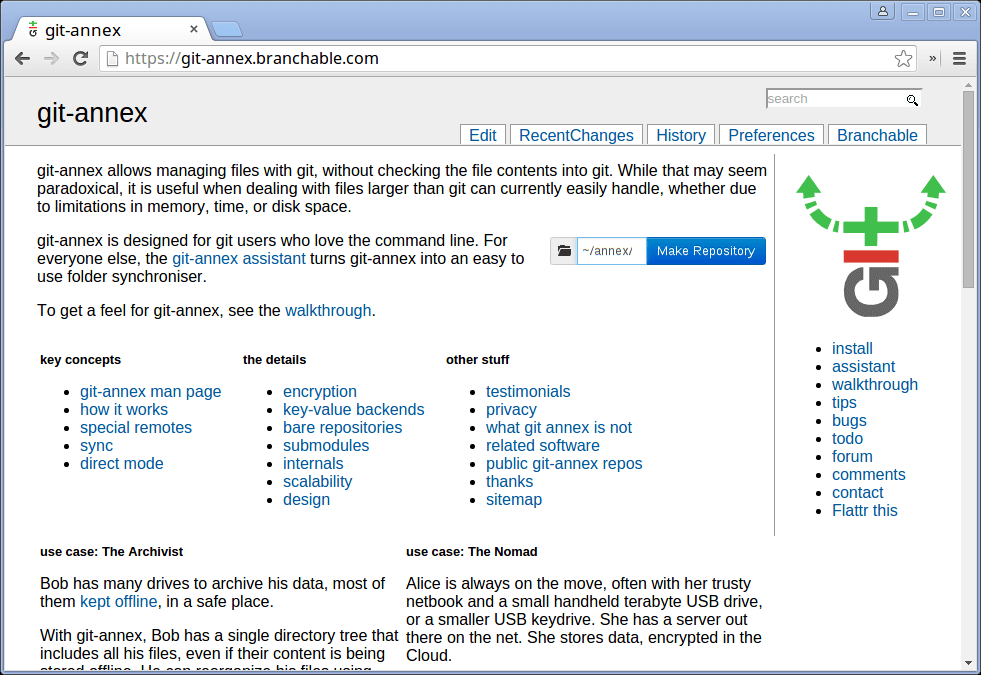
If you check in a file (with a normal git add whatever.mp4), the magic happens via a pre-push hook where LFS will check your watch list and spring into action if needed.

Tack it on to your repository, tell it what kind of files to watch, and then pretty much forget about it. Git LFS is at the other end of things: a bit nicer-looking, a bit more straightforward, and significantly simpler. The git-annex project site reveals a lot: plenty of features, updates, discussions, and enough threads that some sort of trail off. It’s easy enough to check in files and sync them among various locations, but there are also testing tools, a web-based GUI, and lots of options you can use in different situations. In other words, my experience with Annex is that it’s full-featured and a bit less focused in its approach. Git LFS is more like your large file personal assistant, working alongside you to keep track of things you’ve pointed out.
#GIT ANNEX UNLOCK PRO#
You’ll need to walk up to ask your question or return your book, but the librarian can help you in a variety of ways by getting books moved around, checking up on things, and generally being a pro at cataloging stuff. Think of Git Annex as an experienced librarian waiting at the information desk. GitHub opted to support Git LFS, which I’ve only started poking at now that GitLab decided to support it, too.īut which one to use? Each will help you solve that large-file problem in a slightly different way. I’ve been working with Git Annex thanks to GitLab’s adoption early this year. “Idiot,” they snarked, begrudgingly fixing your mistake while secretly acknowledging that you had a point. home/mmaclean/projects/def-flepore/mmaclean/parallel_analysis/containers/images/bids/bids-mriqc-0.16.1.Many of us have felt the shameful sting of committing a large file to an otherwise pristine repository. skip_bids_validation -notrack -stop-on-first-crash fs-license-file /mmaclean/license/freesurfer.txt \ mmaclean/raw /mmaclean/fmriprep-output \

home/mmaclean/projects/def-flepore/mmaclean/parallel_analysis/containers/images/bids/bids-fmriprep-21.0.1.sing \ B /home/mmaclean/projects/def-flepore/mmaclean:/mmaclean \ You might need to unlock the container to be able to use itĭatalad unlock containers/images/bids/bids-fmriprep-21.0.1.sing retrieve the container you want, e.g., fmriprepĭatalad get containers/images/bids/bids-fmriprep-21.0.1.sing See if you need to delete files from scratch once jobs are complete- fmriprep output is quite heavyĭownload the containers for fmriprep and mriqc here:ģ. check usage/space left on cluster: `diskusage_report`ġ. Keep a working directory, if things crash you don't have to start from the beginningġ. Use `$SCRATCH` disk to run your scripts, because `$SCRATCH` is much faster than $HOME`.ġ. Having the job ID as part of the file name is convenient for troubleshootingįiles will be output according to where you specified in your bash scriptġ. slurm-65869853.out, in the directory from which the job was submitted. Use email notification to learn when your job starts and ends by adding the following at the top of your script:īy default the output is placed in a file named "slurm-", suffixed with the job ID number and ".out", e.g. JOBID USER ACCOUNT NAME ST TIME_LEFT NODES CPUS TRES_PER_N MIN_MEM NODELIST (REASON)Ħ5869853 mmaclean def-flepore_cpu simple.sh PD 5:00 1 1 N/A 256M (Priority) Here is an example of a simple bash script: # Use scp to copy individual files and directories bashrc if you need the module all the time):Įxample: Check if git is available and load it To load module (you can put this in your. There are pre-installed modules that you’ll need to load in order to use. SSH key pairs are very useful to avoid typing passwords


 0 kommentar(er)
0 kommentar(er)
